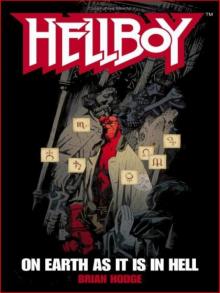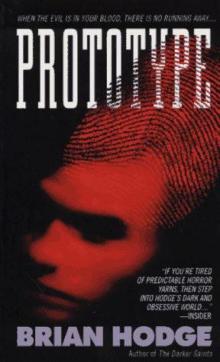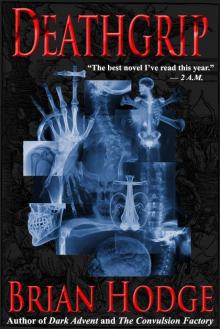- Home
- Brian Hodge
Deathgrip Page 19
Deathgrip Read online
Page 19
Sally Pruett, who smoldered even through binoculars and flaunted that flashy car? Or Edie Carson, as colorless and indistinguishable as her Nova? He was leaning toward the latter, assembling a mental profile of a girl who, years before, endured high school and college with a painful shyness and dreamed of clandestine dates with football captains and wrote poetry inside secret notebooks. Who devoured Harlequin romances by the bushel and turned to nursing half out of a desire to act as Florence Nightingale to someone who, when healed, would fall madly in love with her out of gratitude.
A cruel and sticky business, this formulation of life stories through binoculars. But the world prized beauty above most else, doling its favors accordingly. A world of haves and have-nots, with the former granted far more concessions than the latter.
He need look no further than his own family for evidence. Mike had gotten the looks, without a doubt. Sister Allison, a year older, had merely been warm-up; sweet as honey, right up to the very end, but as plain as a slice of dry toast. Every step of the way, Mike had been the favored child. By teachers, relatives, and neighbors, and, in subtle ways they probably weren’t even aware of, by their parents.
What he wouldn’t give to have a chance to make up for it now. He’d trade anything but his soul for that.
So. Edie Carson it was.
He tailed the Nova, hanging safely back, then edging closer the more traffic picked up. Her first stop was a stucco building with movie posters in the windows, splashy roof sign reading SILVER SCREEN VIDEO. Mike sat idling, watched her take in a stack of three tapes, to emerge minutes later with two more. Observation number one, she liked her VCR.
Her next stop was a deli, then home to her apartment, and the perfect solution came to mind moments later. He careened to the nearest telephone booth, used his credit card to place another call to a Miami TV station. It was booted through the hierarchy until he caught up with a production engineer he hoped would still be there. They slung the bull back and forth with the familiarity of veteran sleaze mongers, and Mike got down to business.
“I need a favor, a biggie,” Mike said. “Could you dub me a video of all the rough footage for those features on faith healers you ran last spring? It doesn’t have to be smooth, or in any particular order. And if you want, you can drop all the evangelist footage except for the Dawson stuff.”
“You gonna have something you can turn us on to?” and Mike told him he might. “No problem, then.”
“And could you overnight that to me? Like tonight?”
A sigh of martyrdom, all the way from Miami. “Yeah, yeah. But you better come through with something good.”
Mike read off his motel’s address from a matchbook pocketed earlier, then fired up a cigarette in nicotine celebration.
Nothing like closing in for the kill.
The package came in the middle of Tuesday afternoon, and there was Mike, rested, two balanced meals in one day, a first. He’d shaved, showered, Visined the roadmaps from his eyes. Clean clothes — tan slacks and white shirt; socks, even. He really was going all-out for this.
Shortly before four, he resumed his stakeout and waited for the familiar gray Nova to putter by. Safer than waiting in her home parking lot, given Murphy’s Law probability that today she would alter her routine.
But no, old habits die hard, and he tailed her with no surprises. Home was an apartment in a complex of sixty or so, buildings of sheetrock and brick and rustic wood trim. Each dwelling with its own little balcony, large enough for a barbecue grill or a chaise longue, never both.
He gave her thirty minutes to settle in, freshen up. When time was up, he gave one last glance into his rearview, brushed his hair into place with fingertips. A silent snarl to check for embarrassing food particles, then a test smile, perfect working order, who could resist that face? Then he pictured Edie Carson slamming a door in it, and the smile drooped.
Tape in hand, Mike left his car, do or die.
Strategy had been a point of great deliberation the last couple of days. He’d decided against running a snowjob, feigning personal interest in hopes of delving into her professional life. It couldn’t be rushed, but moreover, it was downright cruel, and if it blew up in his face, he would have no more chances.
Sincerity, then, appealing to Edie’s concerns for humanity. Admittedly, though, without the tape, he would have been at a loss for an icebreaker.
Second floor, thumbing the doorbell. Noting a change of light in the peephole as she checked him out, and the door opened.
Edie Carson stood in her doorway, hand on the knob. She wore jeans, an oversize T-shirt, hair pulled back into a stub of a ponytail. Face all eyes, wary innocence.
“Miss Carson?” he said, and she nodded. “Hi, my name’s Mike Lancer.” He loosed the smile, the warm one, not its flirtatious cousin. “I’m a reporter from a Florida-based newspaper, and I was wondering if I might talk to you for a few minutes.”
Wariness deepening, “About what?”
Here it was, make or break: “Your current employer.”
“I have to go now.” Averting her eyes and setting the door into motion; she would make a terrible liar.
Mike’s free hand shot out, stopped the door. Thin ice, he was definitely skating on thin ice here. “Please. You don’t have to say a word if you don’t want to. But if you could do just one thing for me—”
“I don’t even know you!”
“If you could just watch what’s on this videotape.” He held it up, took his other hand from the door. “I’ll sit outside the whole time. But if you’d take a few minutes to watch it, maybe you’ll change your mind. For what it’s worth, though, it’s no secret. I know you’re working for Donny Dawson.”
Standing in her doorway, Edie’s face was that of a child, hesitating atop a sliding board; could she trust someone to catch her at the bottom? He offered the tape again.
“I guess I can at least watch it,” and she accepted. Then met his gaze on even terms. “But you’re not coming inside.”
He stepped back from her threshold, lifting his hands, you’re the boss. “I’ll wait on the steps.”
She hurriedly shut the door; two clicks, knob lock and deadbolt, then the chain, and he grinned. Wandered along the concrete landing and took a seat on the top stair. A cigarette made the waiting easier, turned into two. Hot winds taunted him, carrying gusts of music from open windows. Country and Wagnerian opera. Smoke from grilling steaks drifted past, and now, more than ever, he longed for home. His roots, however humble, were at least his own. Looking to rip open other lives in an unfamiliar state, too far from home — who could live like that for long?
Mike wished he could watch Edie’s face for her reactions to the tape. Yes, the video was rough, it lacked the polish of editing and the cohesion of voiceover introductions. But it also contained material never seen in the finished product of a weeklong series of nightly features. Some of which was the most damning of all.
He’d watched his own copy to know it by heart:
There are the false starts, the outtakes as the on-location reporter fumbles words and flubs lines and, in one joking moment, wags his microphone like a phallus.
Behind him, in one shot, the plaza before a Miami auditorium, swarming with people of all ages and backgrounds, and the reporter informs the camera that all have come to see evangelist Donny Dawson.
Another shot: Amanda Dawson speaking inside the lobby to a stooped old woman with a cane. Wizened as a prune, but unexpectedly spry as she hands Amanda a beige notecard which she has just filled out.
“One common tactic used by faith healers is to have assistants acquire personal data from their followers before the show,” says the reporter. “They will then use various methods of memory recall during the service to give the appearance of being given knowledge by divine means.”
The camera tracks as he approaches the woman Amanda Dawson has just left, and tries to engage her in conversation. She eyes him with suspicion, then undisguised hostility
when he asks what sort of information she provided on the card. Despite the evidence on tape, she denies it all, no, no, there is no card.
“Why, you’re not true believers!” she cries. “I shouldn’t be talking to you. Get thee behind me, Satan!”
Another shot, the reporter seated in a modest living room, open and breezy, numerous green plants, and he speaks with a diminutive man with white hair and hawk’s eyes. A superimposed caption identifies him as a spokesman for a group known as the South Florida Humanist League.
“Some people maintain that while the faith healers are not actually healing,” the reporter says, “they should be left alone to conduct what are essentially little morality plays. What’s the harm in what they’re doing?”
“The harm,” says the white-haired man, “is that not only are they deceiving people outright with so-called divine cures, they’re also killing people. They’re convincing these people that they don’t need to take their medication, and don’t need to seek or continue medical treatment for serious health problems. They’re saying that so long as you sufficiently believe in their nonsensical laying on of hands, everything will be fine and dandy. Well, it’s not fine and it’s not dandy — because a lot of people are dying from it. Or at the very least, living in misery they could otherwise be avoiding.”
Another shot: Outside the Dawson rally, preshow. Young mother, poorly dressed, pushing her wheelchair-bound daughter toward the entrance of the auditorium. The child can’t be much more than six or seven; beneath a thin quilt, her legs are obviously twisted from birth defect, accident, illness. Yet their eyes are brighter than freshly minted coins, full of anticipation.
Again, the camera tracks as he approaches, and their eyes shine even brighter with the expectation of seeing themselves on TV. They make willing subjects, eager to make their private miseries public.
“And why are you here today?” the reporter says.
“We came because Donny Dawson wrote us and told us a miracle is coming our way,” Mom explains. “We just know he can heal Kathy and make her normal. He really knows what God’s will is.”
Their excitement is bolstered all the more the closer they get to the entrance.
Another shot, still outside, post-rally, people in mass departure. Including the same mother and daughter interviewed earlier. The child is still confined to her wheelchair, and the only difference from before is that now they head in the opposite direction. And the addition of a great many tears.
“These two never even got close to Donny Dawson today,” he says, their sorry plight depicted in the background. “Although our cameras were not allowed inside the actual rally, I did see that ushers escorted them to a dark, secluded alcove for the entirety of the program, along with several others with obvious health problems. None of them were ever called forward. None of them received the slightest attention from either Dawson or his staff … except when it came time to collect the offering.”
The camera tracks relentlessly as the reporter approaches them once more, a span of just over four hours, yet filled with a lifetime of humiliation and shattered hopes and perhaps the realization that Donny Dawson Ministries has just played out a grand joke at their expense.
As soon as she is aware of the crew’s approach, the little girl hides her face — red-eyed and smeared with snot — by tugging up her quilt, fumbling it over her head. The revealed legs, poking from a threadbare dress, are every bit as wasted as conjecture might imagine. Her mother, equally overcome, averts her eyes, pushes the wheelchair with renewed determination, shoulders hitching with minor spasms.
And in the plaza before the auditorium, surrounded by hundreds who apparently believe they have witnessed miracles, the reporter stops ten feet from his quarry. And lets them pass. He turns to face the camera, mouth compressing into a downturned crescent as he makes a slashing movement across his throat. Does it again, and he looks too tired to continue.
“I can’t do it,” his voice a hoarse whisper. “Shut it off. I can’t do that to them.”
Cut to the static of blank tape.
Scrape the underbelly, and you would eventually see more than you wanted. Mike knew this all too well.
So he sat, smoked another cigarette, and when he heard Edie Carson disengage her locks, he didn’t turn around right away. He waited until she stepped from her doorway, came closer. And when he turned, finally, he saw that she didn’t carry the tape to shove back at him.
I’m in, but the victory was hollow. Smash someone’s illusion, and how good could you feel? “So what do you think?”
Edie frowned, blinking, keep those eyes dry. She folded her arms over the shapeless T-shirt and sighed. “I didn’t know … know he was…” And she trailed away. “What do you want from me?”
“I just want to know what’s going on at Dawson’s home. Why three private nurses keep showing up around the clock, seven days a week. Why a guy who says he heals the sick needs you three there in the first place.”
Her face screwed up with deliberation. Such pained eyes. What a delight, she had a wonderfully expressive face. And what horror to realize the pain it took to bring it out.
“He’s a very nice man,” she said. “I mean, it’s so obvious that he loves his wife very much.”
Amanda, huh? He hadn’t even been the first to bring her up. Mike flicked the dead butt of his cigarette down the length of the stairway, watched it land on the sidewalk below.
“He’s also gotten rich on other people’s money claiming to do things he can’t do. You saw that much on the tape. It’s not just some harmless little fantasy everyone’s indulging in.” A thin smile. “As a nurse, don’t you find that a little reprehensible?”
Edie dropped her gaze to the concrete deck. “If all that’s going on, then why doesn’t the government or somebody step in and do something about it?”
“Politics, mostly. A lot of pinheads out there, all they’re interested in is covering their asses and keeping their jobs and offending as few people as possible. Not a one of them wants a public image of being some crusader trying to shut down a preacher. Never mind that he’d be doing a public service, maybe even saving a few lives. The fundamentalist types would turn him into hamburger. And they swing a lot of votes at election time.”
She nodded, leaning against the rustic railing of one-by-sixes. Through the open door of her apartment came strains of local TV news.
“What paper did you say you’re with? You didn’t, did you.”
The urge for another cigarette. “I’m with The National Vanguard.”
Edie rolled her eyes, looked as if she were stopping herself just short of bitter laughter. “Why even bother talking to me? You’ll just print what you want anyway.”
Perhaps it should have stung, but it didn’t.
“No. No, I won’t, I want it to be the truth, all of it. I think in this case the truth is plenty.” His eyes firmly on hers, he was surprising even himself, never recalling any more commitment to a pursuit than in this moment.
“And nothing’s in it for you, right?” Her new skill, sarcasm.
“Satisfaction, mainly. What I really want is to create more public awareness. Look at what the Enquirer did to Gary Hart’s presidential campaign. They were the ones who first broke the pictures of him with his mistress. Nobody remembers it was a tabloid that did it, they just remember the facts. What I want is to make people take the same kind of notice of Donny Dawson. He’s never produced one legitimate healing he can prove. And last year he took in almost thirty million, tax free. You know where a lot of that comes from? A lot of it comes from old women living on Gravy Train so they can send him their pension checks. That’s what Donny Dawson’s about.”
Oh, just shut up; he didn’t know where it all had come from. Neither planned nor rehearsed, just facts absorbed through research, spilling like blood from a wound.
Edie studied him for a long moment, his face, eyes. This woman on the timid and insubstantial side, with such a sharp appraisal it left
little doubt that underestimating her was a mistake. A solid core lined that unremarkable exterior. No surprise, really. It would be a prerequisite to deal with the sick every day.
“This really matters to you, doesn’t it?” She made her first step toward meeting him halfway.
Mike nodded. Sure, why not, let her have it all: “I had a sister. Allison. She was a year older. And she was — I don’t know. Put it this way, I haven’t known many truly kind people in my life, but she was at the top of the list.” He lit up again. Hands shaking? Surely not, a trick of the eye. “She was a diabetic. And very spiritual, always wanting to improve that part of herself. She was trusting to a fault, too. She went to this faith healer’s service a couple years ago. I wish I could tell you it was Dawson, but it wasn’t, so I don’t suppose it matters who. Anyway. He told the entire mob of them they were healed, and all these people came running up to pitch their medicine onto the stage, to show their faith, like, hey, we don’t need these anymore. And Allison was right up there with them, and tossed her insulin onto the scrap heap.”
Edie’s expressive eyes, clouding. She knew the next part.
“She died a few days later. Alone. Just her and her blind faith in something that never should’ve touched her in the first place.”
There was more, but it was trivial, and so he sat, and smoked, and stared at his knees. He couldn’t remember the last time he’d told this story, if ever, and there was no cleansing. You don’t put the senseless deaths behind you, the needless ones; they tag along forever, like demented little dogs. You live with them; die with them, when your turn comes. The best you can hope for is that the tale might once in a while fall on sensitive ears.
The aroma of grilled steaks, hot winds, cool air leaking from her open door. And Edie Carson, coming to sit beside him. Did he even care anymore? Yes, somewhere deep inside, he still did, and she looked to the sky forever.

 The Weight of the Dead
The Weight of the Dead Lies & Ugliness
Lies & Ugliness The Convulsion Factory
The Convulsion Factory Hellboy: On Earth as It Is in Hell
Hellboy: On Earth as It Is in Hell Whom the Gods Would Destroy
Whom the Gods Would Destroy Picking the Bones
Picking the Bones Worlds of Hurt
Worlds of Hurt Oasis
Oasis Nightlife
Nightlife The Darker Saints
The Darker Saints Just Outside Our Windows, Deep Inside Our Walls
Just Outside Our Windows, Deep Inside Our Walls A Haunting of Horrors, Volume 2: A Twenty-Book eBook Bundle of Horror and the Occult
A Haunting of Horrors, Volume 2: A Twenty-Book eBook Bundle of Horror and the Occult Dark Advent
Dark Advent Mad Dogs
Mad Dogs Prototype
Prototype Deathgrip
Deathgrip Falling Idols
Falling Idols